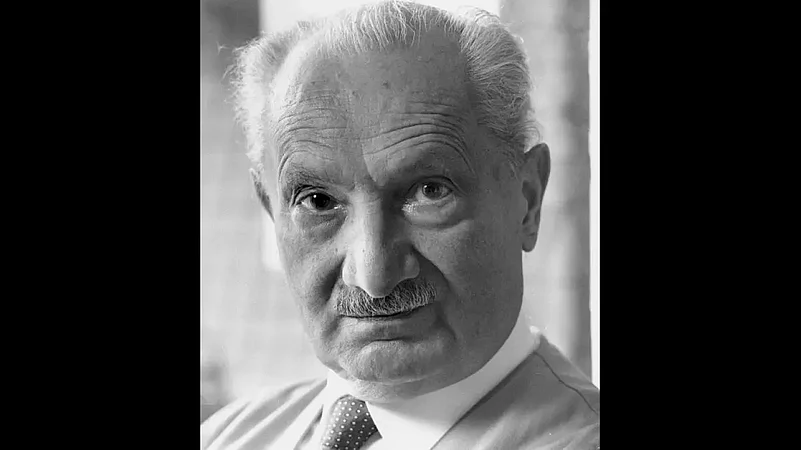It was in the English language that I was initiated into the literary life—through my school and college, and later through my half-hearted peregrinations into reading and writing. I went at the English language with the objective of mastering it—with a purist’s regard for grammar and syntax. And for some reason or the other, I came to the conclusion that in order to do so I needed nothing short of a mental rewiring. I was convinced that knowing the language wasn’t enough; I had to somehow absorb it; I had to start thinking in English, inasmuch as it is possible to think in languages.
Thus began my marriage with English, in my early twenties. That was when I resolved to subject myself to a language detox, with a view to purging my mind of the influence of my mother tongue. I stopped speaking in Hindi, resorting to it only when it was absolutely necessary (and also when I was with my parents). When friends said something to me in Hindi, I would respond in English, and often have whole conversations in this bilingual mode, like some babu in colonial India. (For the record, my wife and I still talk to each other in this way, across languages—she in Hindi and I in English.)
One mind, one language. Such was the dictatorial model of monolingualism that I aspired to. Because I wanted to be a writer, and in that time, in that particular culture where I was growing up, the language of writing was, for a variety of historical and bureaucratic reasons, English.
Naturally, then, I felt—and still feel—like an outsider in Hindi. I say this not without a sense of irony, since I was born into Hindi and formed the first verbal connections with the world through this language. Indeed, there are certain linguistic theories of innatism that give me, as it were, ownership of Hindi, telling me that I carry this language inside me, somewhere in the genetic mix.
And yet, my distance from Hindi had been well established when I, hesitantly, began my journey of rediscovering it—but this time with full awareness of being an outsider in this language. And as it turned out, it was with a work of literature that this journey began. The book, picked up at a roadside stall in Delhi, was Nirmal Verma’s Shabd Aur Smriti (Word and Memory), a collection of essays on literature—rather, on world literature, in that now-forgotten sense of the term. As I slowly made my way through it, astonished by how quickly I had fallen under the spell of Verma’s dreamy, lucid, long-sentenced prose, I realized that I was at a point that marked a momentous turn in my reading life. Such moments are experienced by most serious readers. John Keats compared it to the excitement of ‘some watcher of the skies/ when a new planet swims into his ken’. It’s the moment of discovering something new—a form, a writer, a tradition— that we know we are going to spend the rest of our life with. During that encounter with Verma, I was, of course, discovering Hindi, as though for the first time ever. But there was another discovery being made here, and it had to do with a particular kind of literary imagination that was at home in the world.
**
Shabd Aur Smriti is the slimmest of Verma’s books, but its size is no indication of the impact it had on its readers at the time of its publication (1976), to say nothing of the impact it has had on me. My experience of reading it was rather strange—and strangeness, as the critic Harold Bloom tells us, is the hallmark of the work of literary genius. I was fascinated, impressed, confused and disoriented, all at the same time. For starters, Verma was addressing the ‘Big Questions’ of life and literature. ‘The Crisis of Communication’, ‘The Decline of Prose’, ‘Creative Process and Value Judgement’—the chapter titles would have been enough to put off the casual reader, especially one trained in the stoutly empirical, somewhat anti-intellectual Anglo–American literary tradition. I had been taught to scoff at such grandstanding. Yet, here was a writer who seemed to be saying, against the spirit of the age, that ideas matter.

Verma’s unembarrassed commitment to the life of the mind was as much a gift he’d received through his immersion in European culture—the book’s epigraph is by the French philosopher Simone Weil—as it was a part of his legacy as a Hindi writer, as I was to later understand. But it took me no time to understand that Verma was opening two separate routes for me—one towards Hindi and another towards a Europe whose memories have long vanished, supplanted by the progressive dreams of a globalized, commercialized, Americanized Europe.
Verma’s own discovery of Europe—in the eventful ’60s— had been a turning point in his writing career. It freed him from the intellectual monopoly of the anglophone West (there are political overtones here as well; Verma was a colonial child, born in the British summer capital, Shimla). And Europe brought him into contact with a variety of literary traditions that were contiguous yet dissimilar, provincial yet international at the same time. Europe and India were similar in this respect. But to only notice similarities, as Nabokov reminded us, is the sign of an inferior mind. So Verma was equally, if not more so, interested in grasping the differences between India and Europe, differences that he would explore and expound time and again over the course of his career.
I believe that Europe’s appeal for Verma had much to do with the undefinability of European culture. ‘Europe’ is a meaningless term inasmuch as it aims to define a set of shared affinities and lineages. It isn’t so much a tradition as a concept, an idea. And it is in this context that Borges’s identification with the ‘whole of Europe’ begins to make sense to us; as does John Berger’s aspiration to one day ‘become a European writer’. These writers were not talking about Europe as an inheritance; for them, Europe was equally an invention—it was a utopia that denoted openness, cultural convergence, modernity and individuality.

Traces of the Europe Verma invented can be found in all his books. But it was with Shabd Aur Smriti that I first encountered this imaginary continent, and suddenly a whole new world seemed accessible to me: the world of European thought. Strangely enough, connecting me to it was the Hindi language, making me feel the way Verma’s early readers must have felt when they read the Hindi translations of Czech fiction that he had been doing in the ’60s, or the countless indirect translations he did of passages by the likes of Walter Benjamin, Heidegger, Wittgenstein, Proust and Pasternak. It wasn’t just a matter of discovering these writers through Verma—I had read, or read about, many of them before coming to him. Rather, I was learning to look at them in a new way, to connect them in a new way, despite the obvious incompatibilities. And I was learning how a writer could create a literary tradition through writing. The names mentioned above were as central to Verma’s imagination as those of his forebears and contemporaries writing in Hindi. They were all part of the same tradition—and it is this tradition that I always find myself conversing with when I am reading Verma.

(Excerpted from Vineet Gill’s forthcoming book, Here and Hereafter: Nirmal Verma’s Life in Literature, with permission from Penguin Random House India.)
Vineet Gill is a writer and editor. His essays, often literary–critical in nature and occasionally personal, have appeared in various Indian and international publications. He has spent the better part of the previous decade trying to read and write, and trying to build a life around these two interrelated pursuits. This is his first book.





















